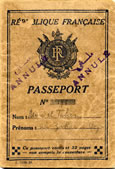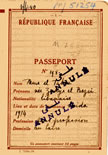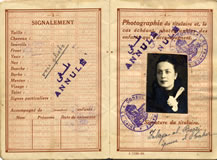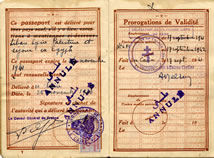To further illustrate the roughness of this officer, when Mrs. Eltaher asked, before being led to prison, to leave the canary, which the family kept as a pet, with the neighbours so that it did not die from thirst or hunger, the officer refused the request. She ended up leaving the bird in his cage on the staircase of the apartment building, hoping that one of the neighbours would find it and care for the orphaned bird!20
When Mrs. Eltaher was brought to the Foreigners' Prison in a police “box”, i.e. van, the warden, Mr. Hickman, a Maltese, received her well and apologized that he had to play the role of jailer for a respectable lady like her. During the few days she spent at his institution he used to share with her some English magazines his wife subscribed to.
Other political prisoners, and in particular the famous Egyptian nationalist Ahmad Hussein, who was ‘hidden’ by the authorities in the Foreigners’ Prison so that his supporters do not find out where he was kept, eventually spotted Mrs. Eltaher, whom they all knew, inside the same prison and staged a mutiny, while threatening to go on hunger strike if she is not liberated.
Prior to her incarceration, colonel Mohamed Youssef had ordered the police physician to perform a gastric lavage on her because he had suspected that she may have swallowed a piece of paper on which the address of Eltaher’s hideaway was written. But the physician refused to perform the procedure, saying that this was something they performed on criminals and smugglers and that it was unbecoming to subject a respectable lady to the procedure.
When Colonel Mohamed Youssef could not capture Eltaher after he had fled from prison and after all attempts by the Ministry of the Interior to find him had failed, the government expelled her from Egypt in October 1941, i.e. during World War II, to twist his arm and get Eltaher give himself up. Her expulsion was built on the pretext that she was an undesirable foreigner. She was escorted by the police from her apartment in Cairo to the train station and put on a British military train going to Lydda (Lod) in Palestine. Mrs. Eltaher effectively carried a French passport issued by France, the mandatory power (a polite term to mean occupying power), in Lebanon at that time. After spending a week in Palestine, she went to Lebanon to live with her relatives while awaiting a resolution to her fugitive husband’s situation.
While on the military train, Mrs. Eltaher was seated in an officers’ section of the train, but as it sped with all lights out for fear of German bomber attacks around the Suez Canal zone, two soldiers got into a fight somewhere in the same train car where Mrs. Eltaher was seated. She told the story a number of times to her children and to some friends, and added that, in the pitch black darkness, one of the soldiers shouted a vulgar insult at his opponent. All of a sudden the whole officers’ corps in the compartment, which was made up of British and Australian troops, immediately shouted back in disdain at the culprit: “shame on you, there is a lady here, and you must come immediately and apologize to her!” Mrs. Eltaher was pretty pleased , but also amused, when the two soldiers who were fighting, came to where she was seated, stood at attention, saluted and the culprit apologized to her: “I am sorry, Ma’am!”
|
|
| Mrs. Eltaher’s passport issued in 1940 by France, the mandatory power in Lebanon |




